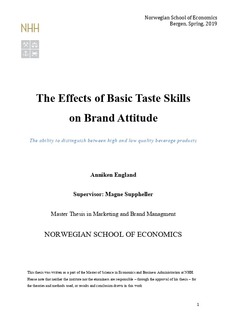| dc.description.abstract | The purpose of this study is to examine the relationship between consumers basic taste skill
and their ability to distinguish between high and low quality products and the moderating
impact of branding.
Grocery stores are competing to sell food at the lowest price, or well-known brands that
consumers prefer. Because consumers are supporting the price war, this results in lower food
quality.
One persons approached to a products from a well-known brand name versus a non-known
brand name, are found to be totally different. A well-known brand will raise interest for a
consumer because of the message it represents and what the consumer can associate him- or
her self with from using that exact brand. Even if the brand is of a high quality product or
low, given a right value for the consumer, the product is chosen. While there is more likely
that a non-known brand will be chosen based on other criteria’s, such as price and design.
Human ability to distinguish between high and low quality is therefore harder to address. Our
sense of taste is therefore interesting to discuss because we might have a strong ability to
taste, but are coloured by the brand.
We conducted a classical experiment on a convenience sample (N = 129) by utilizing six
questionnaires to collect our data. Our research reveals that associative- and instrumental
benefit differentiation does not differ in their positive effect on brand attitude, and that the
associative strategy generates more benefit associations than the instrumental strategy. The
results thus contradict the fundamental view of unique selling propositions and imply that
brands could successfully achieve positive brand attitude with both differentiation strategies.
Further, an associative benefit differentiation strategy should lead to a richer, more positive,
and more sustainable network of associations. We failed to detect that the number of benefit
associations positively mediates the effect of differentiation strategy on brand attitude. This
could imply that one exposure is not sufficient in order to reveal such a relationship.
Keywords: basic skill, taste skill, brand knowledge, brand equality, self-concept. | nb_NO |
